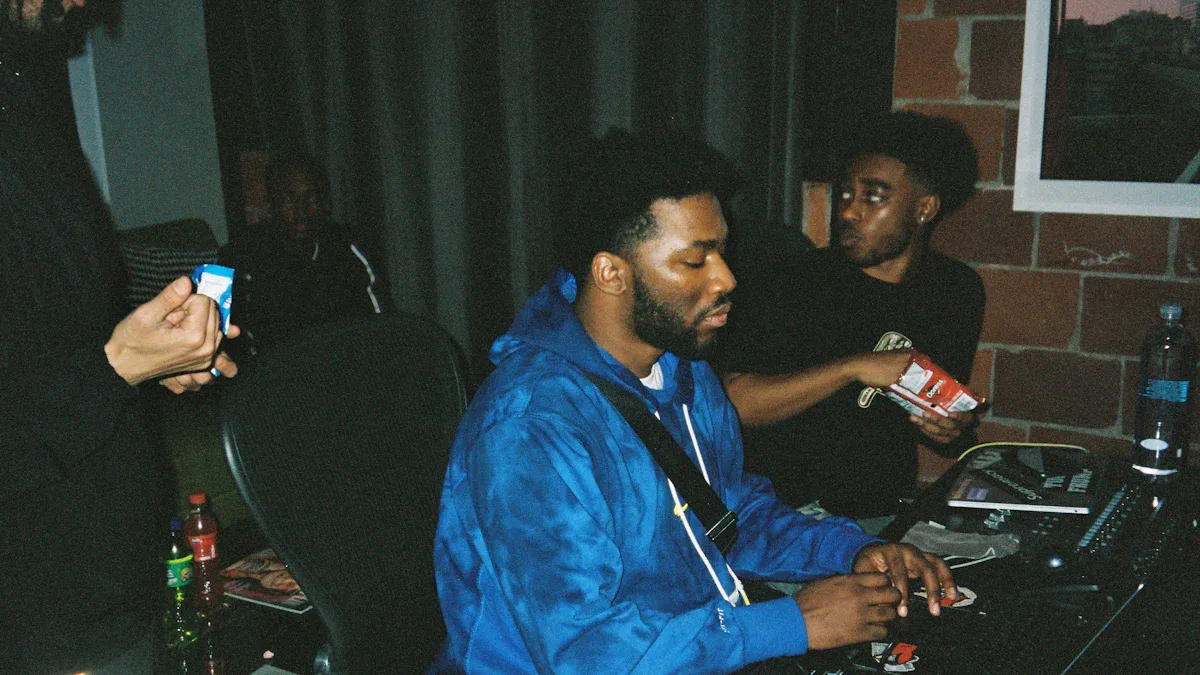Music has always had a powerful influence on our emotions, but not all genres have a calming effect. Some, in fact, can trigger anxiety and stress. Rap and hip-hop with aggressive themes are prime examples.
Research by Ballard and Coates (1995) showed that exposure to violent or aggressive lyrics can negatively affect the listener’s mental state, potentially increasing anxiety—especially for those who are already prone to such feelings. The combination of fast-paced beats, harsh language, and themes of conflict or rebellion in these songs can amplify tension, making them unexpected triggers for anxiety.

How Can Music Affect Anxiety?
Music can affect anxiety in multiple ways. It influences brain activity, heart rate, and even breathing patterns. Upbeat, fast-paced music with aggressive lyrics tends to stimulate the sympathetic nervous system, which is responsible for the body’s “fight or flight” response. This can lead to increased heart rate, rapid breathing, and heightened stress levels. On the other hand, slower tempos and soothing melodies have the opposite effect, encouraging relaxation and lowering cortisol levels (the hormone associated with stress).
Certain genres of music, particularly those with intense or unsettling themes, can also stir up negative memories or emotions, triggering anxiety in some individuals. This effect is especially strong when the music resonates with personal experiences or trauma.
10 Types of Music May Cause Anxiety
Music is a powerful force that can influence emotions and physiological responses in a variety of ways. While many people turn to music as a source of relaxation or inspiration, certain types of music or specific elements within tracks are known to evoke anxiety or discomfort in listeners. These effects are often linked to how music interacts with the brain and body, stimulating heightened emotional states such as stress, discomfort, and unease. Below are some key types and elements of music that may trigger anxiety:
1. Dissonance and Unresolved Harmony
Dissonant chords, or intervals that don’t quite “fit” together, can create a palpable sense of tension and unease. While dissonance has long been used by classical composers like Beethoven and Stravinsky to provoke strong emotional reactions, it’s still a powerful tool in contemporary music. In modern genres like noise rock or electronic music, dissonant elements—such as clashing frequencies or harsh sounds—can intensify discomfort and even heighten anxiety.
2. Fast Tempos
Very fast tempos—typically in the range of 160-200 beats per minute (BPM)—can have a noticeable impact on the listener’s body. These fast rhythms can mimic the physical symptoms of stress, like a racing heart or shallow breathing, which in turn heightens anxiety. This effect is especially pronounced in genres like techno, hardcore, and drum and bass, where the frantic beats and rapid, jarring drum patterns create a sense of urgency.
3. Minor Keys
While major keys are generally linked to happier, more uplifting emotions, minor keys often bring out feelings of sadness, melancholy, or tension. The darker tone of songs in minor keys can naturally trigger an anxious response, as the brain unconsciously associates these chords with emotional discomfort. Whether it’s in classical music, rock, or even pop, songs that feature minor scales can stir up feelings of unease or sadness. These emotions are amplified when the lyrics or themes align with the somber mood of the minor key, making the listener feel even more affected by the song’s emotional depth.
4. Lack of Rhythm or Structure
Music that lacks a clear rhythm or structure can be disorienting. Unpredictable rhythms, irregular time signatures (like 5/4 or 7/8), or music that veers off the beaten path creates a sense of instability. Genres like avant-garde jazz, experimental rock, and free jazz often use these unpredictable elements to break away from traditional forms. While this approach can be artistically compelling, it can also leave listeners feeling uneasy or anxious due to the unfamiliarity or lack of structure. Without a consistent beat or pattern, the listener may feel disoriented, triggering a sense of discomfort or tension.
5. High-Pitched Sounds
Extremely high-pitched sounds, such as screeching tones or sharp frequencies, can be physically uncomfortable and may lead to stress or tension. These are often found in genres like industrial, dark ambient, or experimental electronic music. The sharpness of these sounds can irritate the ear, causing heightened alertness and discomfort. The brain responds by treating these high-pitched tones as potential threats, which can lead to feelings of agitation or anxiety.
6. Sudden Changes or Jarring Transitions
Abrupt changes in dynamics or song structure can startle the listener and raise anxiety levels. Sudden transitions—from quiet to loud or shifts in tempo or key—can disrupt the listener’s sense of stability, causing a shock to the system. This technique is often used in thriller soundtracks or horror music to startle the audience. In popular music, these unpredictable shifts can similarly unsettle the listener, heightening feelings of tension and anxiety.
7. Subtle, Droning Sounds
Drone-based music, with its long, sustained notes or low-frequency drones, can evoke feelings of unease or tension. The constant hum of a drone often mimics sounds like machinery or distant thunder, triggering feelings of claustrophobia or impending doom. This type of soundscape is common in dark ambient music, doom metal, and experimental sound art. The repetitive, low frequencies can create a sense of anxiety in sensitive listeners attuned to these powerful auditory cues.
8. Extreme Lyrical Content
Lyrics that focus on intense, dark subjects—such as isolation, death, despair, or existential struggles—can provoke strong emotional reactions. The explicit nature of themes like nihilism, violence, or suffering, often found in death metal or black metal, can amplify discomfort and anxiety. Depending on personal experiences, these themes can evoke negative emotional responses, especially for listeners who are sensitive to these dark topics. The power of these lyrics lies in their ability to resonate with the listener’s own fears or struggles, heightening emotional discomfort.
9. White Noise and Static
White noise and static—continuous, unstructured electronic interference—can disorient the listener and increase anxiety. These sounds, often used in experimental or noisy music, disrupt the usual harmony we expect from music, causing the brain to remain on high alert. This unresolved, chaotic sound can create a feeling of discomfort as the brain attempts to make sense of it but is unable to, leaving the listener in a state of tension.
10. Chopped or Stuttering Sounds
Glitch or stuttering effects—where sounds are fragmented or broken up—can create a disjointed listening experience, leaving the listener feeling unsettled. These effects, found in genres like glitch music, disrupt the natural flow of the music, making the brain feel unbalanced. The unpredictability of these chopped or stuttering sounds can create a chaotic atmosphere, heightening feelings of anxiety or unease.

How Is Calm Music Good for Anxiety?
Calm music, often referred to as relaxation or ambient music, is known to have a positive impact on reducing anxiety. Slow tempos, soothing melodies, and gentle harmonies help to lower the body’s stress response by triggering the parasympathetic nervous system, which promotes a “rest and digest” state.
Studies have shown that listening to calm music can reduce cortisol levels, lower blood pressure, and slow the heart rate. This allows listeners to relax both mentally and physically, providing a reprieve from the constant tension and stress they may be experiencing. In particular, genres such as classical music, acoustic, and certain types of ambient or new-age music are ideal for relaxation and anxiety reduction.
Music with repetitive patterns and minimalistic arrangements can also be very effective in creating a calming atmosphere. This type of music engages the mind without overstimulating it, creating a safe space for listeners to unwind and experience relief from anxiety.
Related read: Is Tranquil Music Often Quiet?

Best Metal Genre to Calm Down Nerves
Though heavy metal is often associated with intense emotions and aggression, not all subgenres have this effect. Some forms of metal can actually be surprisingly calming, particularly those with slower tempos, clean melodies, and soothing elements.
Subgenres like doom metal and sludge metal often feature slower rhythms and melancholic tones that can promote introspection and emotional release. The heavy, deliberate pace and deep, resonant sounds in these styles can create a meditative, grounding experience. Bands like Black Sabbath and Opeth often incorporate these slower, atmospheric elements into their music, offering listeners a calming experience amidst the heavier, more intense moments.
Additionally, certain types of progressive metal, which often emphasize complex arrangements and ambient sections, can have a calming effect on the listener. The intricate, layered soundscapes in this genre allow for a deeper, more reflective listening experience.
Related read: Different Types Of Metal Music

Depression in Listeners of Different Genres of Music
While some music can provoke anxiety, other types can also contribute to feelings of depression, depending on the listener’s emotional state. Certain genres like blues, grunge, and even some forms of hip-hop may resonate deeply with listeners who are struggling with sadness or depression. Lyrics that address personal suffering, isolation, or existential themes can trigger feelings of empathy or reinforce negative emotions, making it harder for the listener to move past their current emotional state.
However, it’s important to note that music’s impact on mental health is highly individual. Some people find solace in music that speaks to their struggles, while others may find it amplifies their sadness. The key is balance—listening to music that acknowledges one’s emotions without dwelling on them for too long.
In contrast, more upbeat genres like pop, reggae, or jazz are generally seen as uplifting and can help lift the spirits of listeners dealing with low moods. These genres often focus on themes of joy, love, and positivity, offering a sense of relief or distraction from negative thoughts.
Read more: What Genre of Music is the Most Popular?
Conclusion
If you’re feeling anxious, try to find something that interests you to distract yourself. For example, explore the range of music you like, or even try to create music that reflects your current mood. This will not only help you relieve stress but also allow you to better connect with your emotions. If you don’t know where to start, the Tempolor AI music platform may be your right-hand man.
Tempolor is a professional AI music generator that can provide you with high-quality music works, and all music is copyright-free. This means that you can freely apply the created music to various projects without worrying about copyright issues. Whether you want to add music to a video, podcast, or any creative project, Tempolor can provide an ideal choice.
Try creating your own music on Tempolor now! For more information, click here.
FAQ
Can Listening to Music Constantly Be Bad?
Listening to music constantly can have both positive and negative effects, depending on the context and the individual. On one hand, music can be a great source of emotional support, relaxation, and mental stimulation. It can help boost mood, improve focus, and even promote relaxation. However, excessive or constant listening, especially at high volumes, can lead to issues such as auditory fatigue, hearing damage, and even emotional burnout in some cases. It’s important to take breaks and practice moderation. Also, constantly relying on music to mask emotions or distract from problems can sometimes prevent us from addressing deeper issues, which might lead to a sense of avoidance. In general, balance is key.
Does Listening to Music Help You Feel Less Helpless?
Yes, listening to music can help alleviate feelings of helplessness by providing emotional comfort and a sense of connection. Music has the power to evoke empathy, calm anxiety, and promote emotional regulation. For example, listening to uplifting songs or genres that match your current mood can create a sense of solidarity and reduce feelings of isolation. Additionally, music has been shown to stimulate the brain’s reward centers, releasing dopamine, which can improve overall well-being. While music may not solve all problems, it can offer temporary relief and serve as a tool for coping with difficult emotions, making you feel more empowered and less alone in the moment.
Read more: 7 Old Instrumental Bands






